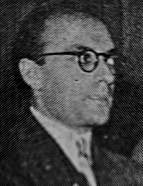

His undergraduate degree thesis outlines an integrated understanding of the liberal revolution of 1820, considering the Western European context (England and France) and the economic, political and technical issues.
Not just the field of political ideas. He rejects the idea that it was a popular movement. Instead , it was ‘the work of the bourgeoisie, burdened primarily by the consequences of the royal residence in Brazil and the weakening of industry and trade’ ( Condições económicas da Revolução Portuguesa de 1820 [Economic conditions of the Portuguese Revolution of 1820] , 2 nd ed., pp. 174-175). However, he was well aware that this social class included different occupational groups: landowners, merchants, industrialists , and legal experts. Fernando Piteira Santos and, later, Miriam Halpern Pereira would provide more elements for characterising the first liberal elite that the young historian only sketched. However, Soares de Azevedo was already distancing himself from the thesis that Freemasonry, as a group, played a decisive role in the revolution – a thesis that would find continuity in the work of Piteira Santos and, later, Silva Dias. On the other hand, JSA relativised the influence of the liberal ideology among the elite in 1820, not forgetting that it was a ‘reaction to a previous system’ (p. 22).
José G. Reis Leite noted that Soares de Azevedo sowed in the Azores ‘the seeds of the Annales [Annals] journal, the taste for economic history and the broadening of the horizons of Azorean history to include the Atlantic and European Expansion’ (‘A historiografia açoriana na 1 . ª metade do século XX … ’ [Azorean Historiography in the first half of the 20 th century] ). Also on the continent, he was one of the young historians who, in the 1940s and early 1950s, contributed to spreading interest in economic history from a transnational perspective, which was characterised by French historiography at the time . Among others, he cited Marc Bloch, Henri Sée, Albert Matthiez , and Pierre-Maxime Schull. As Fernando Piteira Santos would later observe, ‘Forging the doors to the 19 th century, this historical territory that the teaching at the old School did not contemplate, a forbidden area only traversed in the field of literary history, was probably the subversive attitude of Julião Soares de Azevedo in the 1940s’ (‘Última aula – Do antigo regime ao Portugal liberal’ [Last lesson- from the ancient regime to liberal Portugal] [1988]). In fact, contrary to what happened in Spain, research into the 19 th century was not well regarded in Salazar ’ s Portugal since it was identified with journalism and politics.
This work is financed by national funds through FCT - Foundation for Science and Technology, I.P, in the scope of the projects UIDB/04311/2020 and UIDP/04311/2020.
